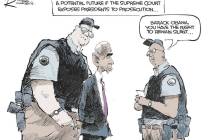White House proposal for tip earners harms jobs
The White House is out with a new report promoting a 232 percent increase in the base wage for employees who receive tip income. If that policy change sounds extreme, it’s because it is — and if it takes effect, the evidence suggests there will be serious consequences for restaurants and the people they employ.
Tipped employees (think: waiters and waitresses) are subject to the same minimum wage as employees who don’t receive tips. Their employers are permitted to pay a lower base wage, as long as employees earn at least the full minimum when tips are included. The difference between the two is called the tip credit.
Restaurants make up the difference if employees don’t earn sufficient tip income to equal the full minimum. In practice, however, this isn’t an issue: Census Bureau data show that the average hourly wage for tipped restaurant employees is above $13 an hour. Top earners bring in $25 an hour or more.
In this way, the tip credit is a compromise that works for both the employer and employee: Restaurants can keep prices low for customers, and servers can earn an hourly wage (tips are treated as wages by the IRS) that’s over 80 percent higher than the federal minimum.
But not everyone agrees: Seven states require tipped employers to pay the full minimum wage to their employees in addition to any tip income received. The evidence from these seven states and others that have substantially increased the base wage for tipped employees should give pause to the White House.
For instance, a study from economists at Miami and Trinity Universities — published last month in the Southern Economic Journal — examined 20 years of government data on tipped employees, and found increases in their base wage reduce employment in the full-service restaurant industry.
What happens to those jobs? The evidence from other states is instructive. In Seattle and San Francisco, for instance — where hourly labor costs are among the highest in the nation — many restaurants have stopped hiring bus boys, opting to have servers bus their own tables instead. Employers have also adjusted work schedules so that fewer servers are needed per shift. In short, there really is no free lunch.
Technology has enabled even larger changes. Restaurant chains have embraced tabletop ordering tablets that reduce the need for servers by as much as 25 percent. And a new report from analysts at KeyBanc Capital Markets suggests that restaurants might be forced to embrace technology more widely as a consequence of mandated increases in labor costs.
“Forced” is the key word here. Even celebrity chef Tom Colicchio — a supporter of a higher minimum wage — estimated that eliminating the tip credit would (all else being equal) jack up food prices by 25 to 30 percent. If restaurants thought they could raise prices accordingly without losing sales, there would be little controversy about the current proposal. (In fact, they would have increased their prices already.)
But it’s precisely because customers are price sensitive and can opt to eat out less often (or not at all) that employers will be forced to scale back on hiring or rethink their business model entirely if the tip credit is eliminated.
There’s an old saying: If it ain’t broke, don’t fix it. It’s good advice for the White House, whose ideas are threatening to make well-paid tipped employment and the income it provides a thing of the past.
Michael Saltsman is research director at the Employment Policies Institute, which receives support from businesses, individuals and foundations.























